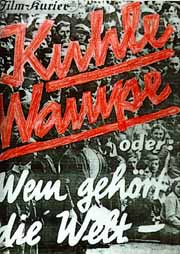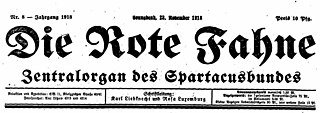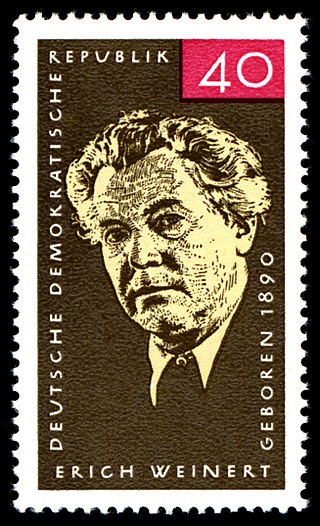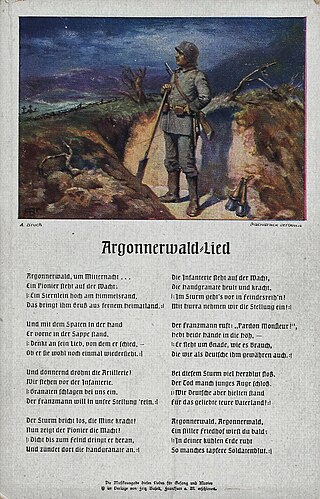
Hanns Eisler was a German-Austrian composer. He is best known for composing the national anthem of East Germany, for his long artistic association with Bertolt Brecht, and for the scores he wrote for films. The Hochschule für Musik Hanns Eisler Berlin is named after him.

The Friedrichsfelde Central Cemetery is a cemetery in the borough of Lichtenberg in Berlin. It was the cemetery used for many of Berlin's Socialists, Communists, and anti-fascist fighters.

Friedrich Wilhelm Ernst Busch was a German singer and actor.

Gerhart Eisler was a German politician, editor and publicist. Along with his sister Ruth Fischer, he was a very early member of the Austrian German Communist Party (KPDÖ) and then a prominent member of the Communist Party of Germany during the Weimar Republic.

Kuhle Wampe is a 1932 German feature film about unemployment, homelessness and left wing politics in the Weimar Republic produced by Prometheus Film. The script was conceived and written by Bertolt Brecht. He also directed the concluding scene: a political debate between strangers on a train about the world coffee market. The rest of the film was directed by Slatan Dudow. The film music was composed by Hanns Eisler.
Bandiera Rossa, often also called Avanti Popolo after its opening words, is one of the most famous songs of the Italian labour movement. It glorifies the red flag, symbol of the socialist and communist movements. The text was written by Carlo Tuzzi in 1908; the melody is taken from two Lombard folk songs.

Die Rote Fahne was a German newspaper originally founded in 1876 by Socialist Worker's Party leader Wilhelm Hasselmann, and which has been since published on and off, at times underground, by German Socialists and Communists. Karl Liebknecht and Rosa Luxemburg famously published it in 1918 as organ of the Spartacus League.

"Peat Bog Soldiers" is one of Europe's best-known protest songs. It exists in countless European languages and became a Republican anthem during the Spanish Civil War. It was a symbol of resistance during the Second World War and is popular with the Peace movement today. It was written, composed and first performed in a Nazi concentration camp by prisoners.

Erich Bernhard Gustav Weinert was a German Communist writer and a member of the Communist Party of Germany (KPD).

Supply and Demand: Songs by Brecht / Weill & Eisler is the first solo album by German singer Dagmar Krause released by Hannibal Records in 1986. It is a collection of 16 songs by German composers Kurt Weill and Hanns Eisler, with lyrics by Bertolt Brecht and sung by Krause in English. She also sang the songs in the original German which were released by Hannibal at the same time on a companion album, Angebot & Nachfrage: Lieder von Brecht / Weill & Eisler.
Hell on Earth is a 1931 German anti-war film directed by Victor Trivas. In France, The film is also known as No Man's Land.

Argonnerwaldlied or "Lied der Pioniere" or "Pionierlied" is a German military march of World War I. It was composed by Hermann Albert Gordon in 1914/1915. It was used during World War I by the German Empire. Variations of the song with different lyrics were used by the Marxist Spartacus League, in Nazi Germany during World War II and in East Germany.
The Lied von der blauen Fahne was an East German patriotic song written by Johannes R. Becher and set to music by Hanns Eisler. Both Becher and Eisler were also the creators of Auferstanden aus Ruinen, which became the national anthem of the German Democratic Republic (GDR).

Sonja Kehler was a German actress and chanson singer, known internationally for her interpretation of works by Bertolt Brecht, first playing his characters on the theatre stage, then focused on singing his songs and those of others in solo programs. She also taught acting in Danish at the theatre academy in Odense, appeared in films, worked as stage director and presented literary programs.
The "Einheitsfrontlied" is one of the most famous songs of the German labour movement. It was written by Bertolt Brecht and composed by Hanns Eisler. The best-known rendition was sung by Ernst Busch.

"Freiheit", also known as "Spaniens Himmel" or "Die Thälmann-Kolonne", is a song written in 1936 by Gudrun Kabisch and Paul Dessau, German anti-fascists. The song was written for the International Brigades but later became a popular standard in Germany and in American communist and folk music communities. The title translates as "Freedom" in English.
The "Solidaritätslied" is a revolutionary working song written between 1929 and 1931 by Bertolt Brecht, and set to music by Hanns Eisler. It was written against the background of the Great Depression, the Great War (1914–18), and the social issues caused by the Industrial Revolution that were explored in Brecht's 1932 film Kuhle Wampe in which the song also appeared.
Nathan "Noto" Notowicz was a German musicologist and composer.

Eberhard Rebling was a German pianist, musicologist and dance scholar as well as an anti fascist.
Rolf (Rudolf) Lukowsky was a German composer and choral director.












